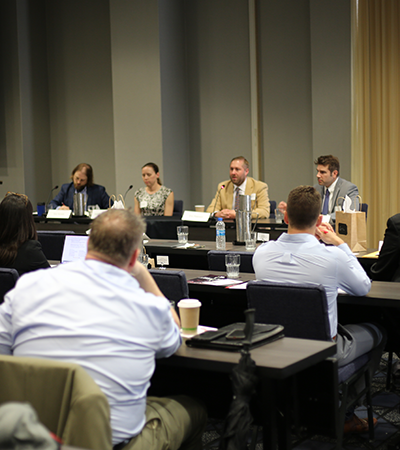26 Apr 2022

The Nebraska Governance and Technology Center hosted leading experts to discuss the role of states in regulating “Big Tech” and to speak on the evolution of public attitudes towards the technology sector, as well as the ways in which efforts to regulate Big Tech are likely to affect consumers at the state level. This was all part of the Center's State Level Issues in Technology, Regulation, and Economic Development. The conference was the first in a 2-year program hosted by the Center that will invite policymakers, enforcement officials, and academics to discuss changing attitudes toward Big Tech and technology regulation.
Over the past decade the technology industry — especially the part of it thought of as "Big Tech" — has gone from being widely viewed with favor to being a target for both the political right and left. At both the federal and state level legislators and regulators are trying to pass laws and use litigation to constrain Big Tech. This shift has been prompted by a range of concerns.
As demonstrated by these widespread efforts, most of the concerns about Big Tech are "national-scale." Many of the concerns, such as the potential for monopolization or the firms' data use practices have traditionally been thought of as best handled at the federal level. Even where the impacts may be felt in individual states, there is little difference on the ground in Arizona, Florida, or Nebraska between the potential impacts of Apple controlling its app store or how Google sells targeted advertising.
This conference explored the role of the states in these issues, considering:
- What has driven the change in attitudes towards the technology sector over the past several years?
- What do we know about consumer attitudes towards technology, including how those attitudes vary from state to state?
- How are efforts to regulate Big Tech likely to affect consumers and industry at the state level?
Panels included conversations assessing consumer attitudes, changes in regulation, and a review of tech policy “then and now.”
This spring’s conference was keynoted by two prominent experts in the evolving political landscape surrounding regulation of Big Tech.
Nebraska Attorney General Doug Peterson has supported strengthened legislation and enforcement in the areas of human trafficking, prosecution of child sexual assault and abuse, and consumer protection laws to safeguard Nebraskans.
Shannon McGregor is an assistant professor at the Hussman School of Journalism and Media and a senior researcher with the Center for Information, Technology, and Public Life at the University of North Carolina, Chapel Hill. Her research addresses the role of social media and their data in political processes, with a focus on political communication, journalism, public opinion, and gender. Her published work examines how three groups – political actors, the press, and the public – use social media in regards to politics, how that social media use impacts their behavior, and how the policies and actions of social media companies in turn impacts political communication on their sites.
For more information about panels, panelists and the conference in general, click here.